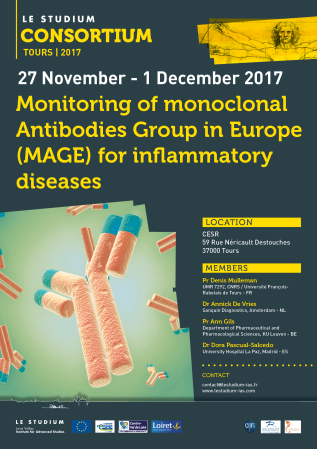Monitoring of monoclonal Antibodies Group in Europe (MAGE) for inflammatory diseases
CESR
59 Rue Néricault Destouches
37000 TOURS
France
Presentation
MEMBERS
- Pr Denis MullemanUMR 7292, CNRS / Université François-Rabelais de Tours - FR
- Dr Annick De VriesSanquin Diagnostics, Amsterdam - NL
- Pr Ann GilsDepartment of Pharmaceutical and Pharmacological Sciences, KU Leuven - BE
- Dr Dora Pascual-SalcedoUniversity Hospital La Paz, Madrid - ES
Description
Biopharmaceuticals, in particular monoclonal antibodies, have radically transformed the course of various conditions, from malignancies to inflammatory diseases. Considerable inter-individual variability in the clinical response has been documented. It has been shown that pharmacokinetics (drug concentration versus time) is highly variable between patients and is related to clinical response, patients with high concentrations of the drug being more likely to respond than those who have low concentrations. Pharmacokinetic and pharmacokinetic-pharmacodynamic (PK-PD) modelling allows a description of the dose-response relationship to identify the sources of inter-individual variability, for both PK and PD-PD relationship. The team is seeking to explain this variability by studing the sources of the inter-individual variability that is observed in the response to monoclonal antibodies. Our work is based on both in vitro and preclinical models and on patient studies. Mathematical models are also used to quantify the influence of the individual sources of variability, to describe biological phenomena, and to design personalized dosage regimens for therapeutic antibodies.
Over the last few years, academic groups have developed tools to monitor the pharmacological effect of therapeutic antibodies by means of measuring trough concentrations and biomarkers of disease activity. This practice called therapeutic drug monitoring (TDM), involves the measurement in sera of the concentration of the drug, often in combination with anti-drug antibodies (ADA) detection on the one hand, and the disease activity of patients on the other hand. TDM may help clinicians to adjust the dose regimen according to individual characteristics to improve clinical outcomes and avoid adverse events related to unnecessary overexposure. This strategy is relevant considering the economic burden of inflammatory chronic disease such as rheumatoid arthritis, Crohn’s disease and multiple sclerosis. However, although TDM of biopharmaceuticals seems promising, its implementation in clinical settings deserves further research to develop reliable and standardized assays, mathematical modelling (population approaches to analyze databases, mechanistic PK-PD modelling, clinical trial simulation) and clinical expertise.
The main aim of the MAGE consortium is to examine the scientific bases of the TDM of monoclonal antibodies in inflammatory diseases. This will be facilitated
- to standardize assays for drug measurement,
- to perform analyses in partnership to develop algorithms for TDM
- to design comparative effectiveness research to validate these tools.







